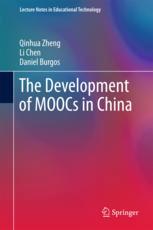

Most ebook files are in PDF format, so you can easily read them using various software such as Foxit Reader or directly on the Google Chrome browser.
Some ebook files are released by publishers in other formats such as .awz, .mobi, .epub, .fb2, etc. You may need to install specific software to read these formats on mobile/PC, such as Calibre.
Please read the tutorial at this link: https://ebookbell.com/faq
We offer FREE conversion to the popular formats you request; however, this may take some time. Therefore, right after payment, please email us, and we will try to provide the service as quickly as possible.
For some exceptional file formats or broken links (if any), please refrain from opening any disputes. Instead, email us first, and we will try to assist within a maximum of 6 hours.
EbookBell Team

0.0
0 reviewsThis book aims at discussing the development of MOOCs in China in relation to MOOCs in other countries or areas. Based on the history of MOOCs, we summarize and compare the development of MOOCs in China and other countries with empirical evidence from a comprehensive investigation about MOOCs in Asian, United States, and Europe. Then we discuss about the importance of MOOCs in China and its role in the reform of higher education system, and the model of teaching and learning in China. After all, we provide suggestions about how to improve MOOCs at the national, institutional, and individual level.
In this book, we analyse and present the current construction and development of MOOCs in China from four dimensions including platforms, courses, learners, colleges and universities based on huge empirical evidence from a comprehensive investigation of 14 platforms, 42 universities, 1388 MOOCs, and 22895 learners. Our investigation mainly focused on seven topics: platform construction and operation, learner groups, curriculum organization form, teaching interaction, learning evaluation model, learning support service, and courses certification and academic score system.
Based on the investigation, we found there is an emerging trend of collaboration among government, universities and enterprise in the development of MOOCs in China, which provides great opportunities to build an innovative educational service system for all kinds of learners. We also discuss our findings in relation to the corresponding development of MOOCs in United States, Europe and other regions and then focus on the unique challenges that China faces, such as the lack of deep learning in MOOCs, the low information literacy and self-regulated learning abilities of MOOC learners, the lack of individualized support for MOOC learners, and so on. At last, this book summarizes the overall development of MOOCs in China and other countries and then put forward the future trends and suggestions in this field.